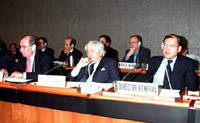NOTICIAS: NOTICIAS 2004
CONSEJO GENERAL 22 DE OCTUBRE DE 2004
Declaración del Director General de la OMC
VER TAMBIÉN:
> Comunicados de prensa
> Noticias
> Discursos: Supachai Panitchpakdi
> Observaciones
introductorias del Presidente del Consejo General
>
Declaración del Director Gerente del FMI
>
Declaración del Presidente del Banco Mundial
> Más
información sobre las Coherencia
> Más
información sobre el Consejo General
I first want to welcome Rodrigo de Rato and Jim Wolfensohn, and to express
my sincere gratitude for your friendship, leadership and advice. This is
the second year in a row that the heads of the IMF and the World Bank
have travelled to Geneva to attend a WTO meeting on Coherence. Your
presence sends a powerful message, not just about the importance of
coherence among our institutions, but about your commitment to the
multilateral trading system and the success of the Doha negotiations.
I think we can all agree that these negotiations are one of the most
important issues on the global economic agenda. As was emphasised at the
recent Bank/Fund Annual Meetings, the current economic recovery is broad
but fragile. We have a window of opportunity to deepen structural
reforms, strengthen global markets, and ensure that the current
expansion is sustainable. Nothing would contribute more to its
sustainability than further opening world markets and strengthening
trade rules under the Doha Round.
The outlook for the WTO has changed significantly since the summer. The
July General Council Decision has put the Doha negotiations back on
track, and eased many of the concerns we felt in the aftermath of
Cancún. It represents an important step forward in the Round — and has
injected new momentum into the Geneva process — but it is not an end in
itself. This Round will be judged, not by what we say today, but by what
we achieve at the end of the negotiations. Success — as the IMFC
communiqué reminds us – “will require the full commitment of all parties,
in particular strong leadership from the major trading nations, and
readiness of all countries to embrace the opportunities provided by more
open trade”.
Cooperation among the three major international economic institutions
has never been more critical. At the last Coherence meeting, Members
encouraged us to focus our cooperation on three areas in particular —
policy analysis and advice, technical assistance, and adjustment
assistance. Let me highlight three concrete areas where progress is
being made — the details of which can be found in the background
document for this meeting.
First, the Trade Integration Mechanism. Last May, Anne Krueger briefed
us on this new IMF policy, and explained that financial assistance would
be available to low income developing countries to help them cope with
adjustment difficulties arising from loss of trade preferences in the
Doha Round, as well as from the elimination of textile quotas at the
start of next year. The task now is for the Secretariat to continue
working closely with IMF staff to help WTO Members to evaluate the
opportunities presented by the Trade Integration Mechanism.
Second, the Cotton Initiative. The July Decision explicitly calls on the
WTO to work closely with the IMF, the World Bank, and other
international financial institutions on development aspects of the
Sectoral Cotton Initiative. Let me use this opportunity to ask my
friends, Rodrigo and Jim, to redouble their efforts to see how existing
programmes — as well as additional resources — can be directed towards
development in those economies where cotton is vitally important, as we
agreed in Cotonou.
Third, Trade Facilitation. The July Decision also invites the IMF and
the World Bank to cooperate with the WTO to make technical assistance
and capacity building more effective and operational in support of the
negotiations on trade facilitation, which were launched this summer. The
World Bank, in particular, has done excellent work in examining the
costs of excessive red-tape for developing countries trying to encourage
trade and investment — and I think this is an area where there is huge
potential for synergies among our institutions.
I have mentioned three areas where the WTO is looking for — and
receiving — tangible support from the Bank and the Fund. Let me also
draw your attention to an area where the IMF and the World Bank are
looking for support from the General Council. A positive response by the
WTO to requests for observer status in the TNC and its subsidiary bodies
would give the IMF and the World Bank first-hand information on where
their contribution to the success of the Doha negotiations can most
usefully be made. Already they contribute actively to the work of many
councils, committees and working groups of the WTO. Extending their
observer status to the TNC would be a logical step — and would certainly
add to the level of coherence of our work, in particular to lend full
support to the DDA.
I want to conclude with the observation that these General Council
Meetings on Coherence are obviously increasingly important — as
underscored by the presence of Rodrigo de Rato and Jim Wolfensohn today.
But there is also growing value in having on-going work on Coherence at
the technical level in the Working Group on Trade, Debt and Finance. Two
Coherence issues — trade financing and exchange rate volatility — have
already been usefully taken up at a technical level in the Group. I also
note that Coherence is on the agenda for the Group's December meeting.
As we begin today's discussions, I encourage Members to think about how
we can build further on this progress.
Thank you.

IMF Managing Director Rodrigo de Rato, World Bank President James D.
Wolfensohn and WTO Director-General Supachai Panitchpakdi listen to the
General Council debate on coherence in global economic policy-making.
